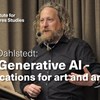application5

Ambivalence: A new unified theory about its nature, grounds, and application to normative conflicts
Having mixed feelings about something can help us to deal with conflicts. Since this view on ambivalence challenges traditional approaches that see ambivalence as a flaw, this project aims to develop a new theory of ambivalence.
Do Employers Prefer Fathers? Evidence from a Field Experiment Testing the Gender by Parenthood Interaction Effect on Callbacks to Job Applications
European Sociological Review, 2017, Vol. 33, No. 3, 337–348 In research on fatherhood premiums and motherhood penalties in career-related outcomes, employers’ discriminatory behaviours are often argued
POSTPONED. NEW DATE PENDING. James Fishkin: Democracy When the People Are Thinking: Applications of Deliberative Democracy
Postponed. New date pending. James Fishkin, Professor of Communication, Professor of Political Science (by courtesy) and Director of the Center for Deliberative Democracy, Stanford University. Abstract D
Olle Häggström: Bayesian and non-Bayesian epistemic attitudes, with applications to the atomic bomb, artificial intelligence, covid-19 and existential risk (webinarium)
Olle Häggströmis professor of mathematical statistics at Chalmers University of Technology, researcher at the Institute for Futures Studies and a board member of the Royal Swedish Academy of Sciences

Big generative AI - Implications for creativity, art, and artists
Research seminar with Palle Dahlstedt, Professor in Interaction Design at Gothenburg University. In this lecture, Palle Dahlstedt will share a pragmatic, critical, and visionary view of what machine l
A talk on implications of self driving vehicles
Listen to our Director Gustaf Arrhenius'talk "Ethical, legal and political implications of self driving vehicles", held at the Transport Initiative Seminar at Chalmers University of Technology in Gothe
Palle Dahlstedt: Big generative AI - Implications for creativity, art, and artists
Date & Time: Wednesday, June 12 at 10:00-11:45 (CET)Venue: Institutet för framtidsstudier, Holländargatan 13, 4th floor, Stockholm, or online. Research seminar with Palle Dahlstedt, Professor in In
Deep learning diffusion by infusion into preexisting technologies - Implications for users and society at large
in: Technology in Society. 63, 101396 Abstract:Artificial Intelligence (AI) in the form of Deep Learning (DL) technology has diffused in the consumer domain in a unique way as compared to previous gene, i.e., by being added to preexisting technologies that are already in use. We find that DL-algorithms for recommendations or ranking have been infused into all the 15 most popular mobile applications (apps) in the U.S. (as of May 2019). DL-infusion enables fast and vast diffusion. For example, when a DL-system was infused into YouTube, it almost immediately reached a third of the world's population. We argue that existing theories of innovation diffusion and adoption have limited relevance for DL-infusion, because it is a process that is driven by enterprises rather than individuals. We also discuss its social and ethical implications. First, consumers have a limited ability to detect and evaluate an infused technology. DL-infusion may thus help to explain why AI's presence in society has not been challenged by many. Second, the DL-providers are likely to face conflicts of interest, since consumer and supplier goals are not always aligned. Third, infusion is likely to be a particularly important diffusion process for DL-technologies as compared to other innovations, because they need large data sets to function well, which can be drawn from preexisting users. Related, it seems that larger technology companies comparatively benefit more from DL-infusion, because they already have many users. This suggests that the value drawn from DL is likely to follow a Matthew Effect of accumulated advantage online: many preexisting users provide a lot of behavioral data, which bring about better DL-driven features, which attract even more users, etc. Such a self-reinforcing process could limit the possibilities for new companies to compete. This way, the notion of DL-infusion may put light on the power shift that comes with the presence of AI in society.
Anna Dreber Almenberg: Which results can we trust? Using replications, prediction markets and other tools to assess the reproducibility of scientific results.
Anna Dreber Almenberg, Professor of Economics, Stockholm School of EconomicsAbstractWhy are there so many false results in the published scientific literature? And what is the actual share of results
Implications of climate change for policing practice worldwide
Venue: Institute for Futures Studies, Holländargatan 13 in Stockholm, or online Welcome to a seminar arranged in collaboration with two visiting researchers from the Hague University of Applied Science,








